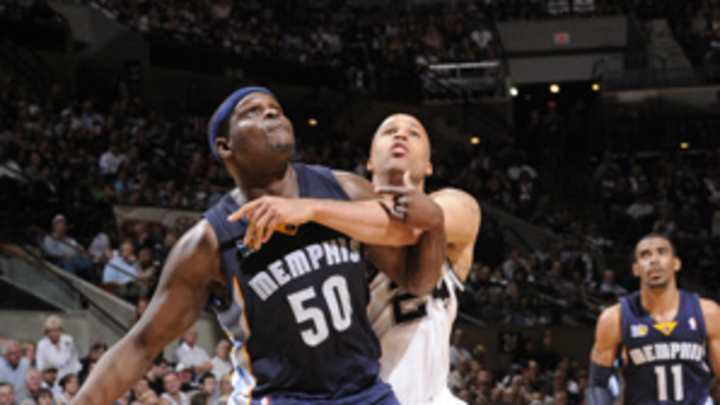Fast Breaks: Grizzlies vs. Spurs, Game 1

• It's only fitting that Gasol played a key role in the Grizzlies' game-saving run. Although he initially had trouble defending Tim Duncan's face-up work in the low post, Gasol offset Duncan's production with his own scoring before improving his individual defense in the second half. There's no question that Gasol benefits tremendously from playing alongside another capable post and mid-range threat in Zach Randolph, but the real strength of the duo is its synergy; both players are capable of operating from the low or high post, which gives Memphis' offense a surprising amount of flexibility.
Opposing teams are simply unable to hide a weak defender on either player, as the collective range, touch and size of Gasol and Randolph allow them to exploit mismatches efficiently. For the Grizz to have two productive bigs capable of playing both inside and out is a tremendous advantage, particularly because of the limited players that San Antonio typically utilizes alongside Duncan in the frontcourt (the aging Antonio McDyess, the undersized DeJuan Blair and the defensively inept Bonner).
Additionally, Gasol is a solid interior passer (as is Randolph), despite his reputation of being a black hole on offense. The ability to pass effectively between bigs is an easy way to counter overzealous collapsing defenses, and a quick dish to the opposite side of the lane from Gasol to Randolph, or vice versa, is an effective (if only circumstantial) weapon. Randolph, for example, may have only notched three assists in this particular game, but two of those passes led directly to layups.
• The Grizzlies' Tony Allen is among the best perimeter defenders in the league, but his impact is slightly muted when he doesn't have to worry about Manu Ginobili. We saw him guard Tony Parker on occasion, but Allen's primary function in this series is to lock down on the Spurs' most explosive and dynamic scorer, who was on the bench in street clothes. Allen still played solid D, notched three assists and added a few buckets in limited minutes, but we'll have to wait until Game 2 for the full Tony Allen experience.
• Memphis may be an improved team on both sides of the ball, but there's simply no way the Grizzlies continue to out-shoot the Spurs at such a ridiculous rate. In Game 1, Memphis' effective field goal percentage was 15.4 points higher than San Antonio (partially because the Grizz converted six of their 10 three-point attempts, a quite the feat for the league's fourth-worst three-point shooting team), despite the fact that the Spurs had the league's best effective field goal percentage during the regular season. Having Ginobili back in the lineup will certainly help the Spurs' shooting, but we should also expect San Antonio to convert more regardless. According to Hoopdata, the Spurs went 7-of-33 between three and 23 feet, while scoring consistently at the rim, beyond the three-point arc and at the free throw line on Sunday. Credit Memphis' solid defensive effort for some of the Spurs' struggles but not all: San Antonio just couldn't hit the shots it needed Sunday.
• Why does Gregg Popovich remain so reluctant to play 6-foot-11 Tiago Splitter, particularly when San Antonio's other big man options were dominated on the defensive end? Blair grabbed five offensive rebounds to go with nine points, and Bonner scored 12 of his own (while nearly winning the game by way of his three-pointers). But both players, as well as the largely ineffective Antonio McDyess, were useless on the defensive end. Yet Splitter remained glued to the bench, even as Randolph and Gasol muscled their way to the rim. Even foul trouble to Blair, McDyess and Duncan couldn't give Splitter a much-needed opening for court time.
It's understandable that Pop may not want to disrupt the rotation he's used all season, but seeing what Splitter could offer in these circumstances just seems like a no-brainer. He remains a defensive option, but for whatever reason, remains a card that Pop is unwilling to play.
• It's almost impossible to replace the production and influence of Ginobili, but the Spurs' best hypothetical chance of filling that void would come through some combination of a productive George Hill, a dialed-in Duncan and a more aggressive Parker. Hill was able to get to the line 13 times and post a respectable line (seven rebounds, three assists, four steals), but he wasn't able to convert enough of his shots (just 2-of-7 from the field) to provide a true Ginobili substitute. Duncan was efficient, but restricted enough so that his performance was lacking. Parker looked to score, but struggled as a result of the Grizzlies' aggressive team defense. Memphis collapsed on Parker when he entered the lane, blocking avenues to the basket and clogging passing lanes. Parker was still able to score relatively efficiently thanks to 16 free throw attempts, but those foul calls don't discount Memphis' well-executed defense.
